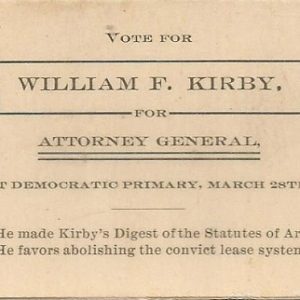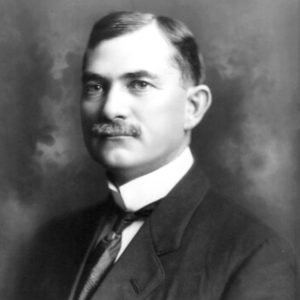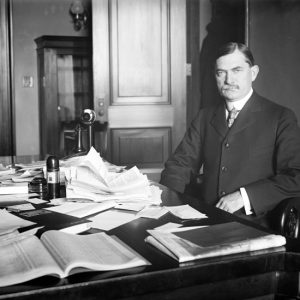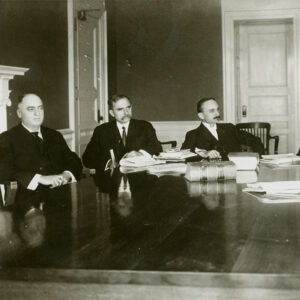calsfoundation@cals.org
William Fosgate Kirby (1867–1934)
William Fosgate Kirby was an associate justice on the Arkansas Supreme Court and also served as state attorney general and U.S. senator. A friend and political ally of Jeff Davis, Kirby was a member of the Democratic Party and an ardent agrarian populist. His convictions led to his spirited opposition to President Woodrow Wilson’s efforts to involve the United States in World War I.
Born on November 16, 1867, near Texarkana (Miller County), William F. Kirby was the son of Joseph F. and Martha (Ferguson) Kirby. His father was an ex-Confederate who moved into the state from Alabama and took up agriculture. Kirby grew up on the family farm with his three brothers. He received his secondary education in local public schools at Miller County, Arkansas, and Bowie County, Texas.
Kirby enrolled in Cumberland University at Lebanon, Tennessee, in 1883. By 1885, he graduated with a bachelor’s degree in law. His father also attended Cumberland and graduated in the same class.
Soon thereafter, Kirby returned to Arkansas, where he was admitted to the bar. In June 1885, he opened a law office with his father in Texarkana. At the age of twenty-one, he was elected to the board of education in Texarkana. He married Ella Kelly of Texarkana on October 19, 1898. The couple had one son.
In 1892, Kirby was elected to represent Miller County in the Arkansas General Assembly, serving two terms in the House and a single term in the Senate, where he was a member of the judiciary committee. Kirby’s stint in the Arkansas legislature is notable for his avid support of Governor Jeff Davis and his dogged pursuit of railroad regulation. In 1903, he was commissioned by the General Assembly to produce an authoritative compilation of Arkansas’s statutes, resulting in the 1904 publication of Kirby’s Digest of the Statutes of Arkansas.
Kirby was elected as attorney general in 1906 and served a single term. While in office, he actively enforced Davis’s 1905 antitrust act to prosecute corporate price fixing. With Davis’s backing, Kirby made his bid for the 1908 Democratic gubernatorial nomination, squaring off against George Donaghey. However, despite Davis personally campaigning for him, Kirby came in second place.
After his defeat, Kirby returned to his law practice, maintaining homes in Texarkana and Little Rock (Pulaski County). For some time, he served as attorney for the railroad commission enforcing freight and passenger rate regulations. In 1910, he was elected associate justice on the Arkansas Supreme Court.
Kirby ran for the Democratic nomination for U.S. Senate in 1914. His opponent was the incumbent, Senator James P. Clarke. The election was a close one, hinging upon a revision of the tally on the final night of vote-counting in Poinsett County; the new tally made Clarke the winner. Despite protests from Kirby supporters and allegations of vote fraud, Clarke was declared the victor. However, Clarke did not live to finish his term, dying on October 1, 1916. The governor called a special election for November 7, 1916. Kirby secured the Democratic nomination and defeated the Republican candidate, Harmon L. Remmel, in the general election.
As a U.S. senator from 1916 to 1921, Kirby was one of eleven Democrats who consistently resisted President Wilson’s efforts to involve the United States in Europe’s struggle. As a member of the Military Affairs Committee, he believed that America should strive for neutrality. Kirby speculated that it was the business community that was pushing for war and so voted against the armed ship bill and breaking diplomatic relations with Germany. In his antiwar stance, Kirby found himself at odds with the popular war sentiment throughout the state. The Arkansas Gazette was particularly harsh toward his opposition, and even the Arkansas legislature issued a subtle censure.
Kirby ran for reelection against Thaddeus H. Caraway, who had been the prosecuting attorney for the state. Caraway’s successful campaign attacked Kirby’s war record and his early diffidence toward President Wilson’s foreign policy.
Upon returning to Arkansas, Kirby opened a law office in Little Rock and resumed his practice along with former governor George W. Hays. In 1926, Kirby once again was elected an associate justice on the Arkansas Supreme Court after the legislature voted to create two additional seats.
Thaddeus Caraway died on November 6, 1931, leaving his U.S. Senate seat vacant. To fill the vacancy, Governor Harvey Parnell appointed his widow, Hattie Caraway, to serve out the term. In 1932, Caraway ran for reelection with the aid of Senator Huey P. Long. Kirby, running for the Senate again, launched vitriolic assaults on Long’s involvement and discounted Caraway’s ability to hold public office. He fared poorly in the election, coming in a distant fifth place.
Kirby died of a heart attack on July 26, 1934. He is buried at State Line Cemetery in Texarkana.
For additional information:
Moses, Colter Hamilton. “Memoirs of C. Hamilton Moses.” C. Hamilton Moses Papers. Special Collections. University of Arkansas Libraries, Fayetteville, Arkansas.
Niswonger, Richard Leverne. “William F. Kirby, Arkansas’s Maverick Senator.” Arkansas Historical Quarterly 37 (Autumn 1978): 252–263.
Williams, Harry Lee. Behind the Scenes in Arkansas Politics. Jonesboro, AR: 1931.
Geoffery L. Stark
University of Arkansas Libraries
 Arkansas General Assembly
Arkansas General Assembly Early Twentieth Century, 1901 through 1940
Early Twentieth Century, 1901 through 1940 Kirby Campaign
Kirby Campaign  William Kirby
William Kirby  William Kirby
William Kirby  Supreme Court Members
Supreme Court Members 




Comments
No comments on this entry yet.